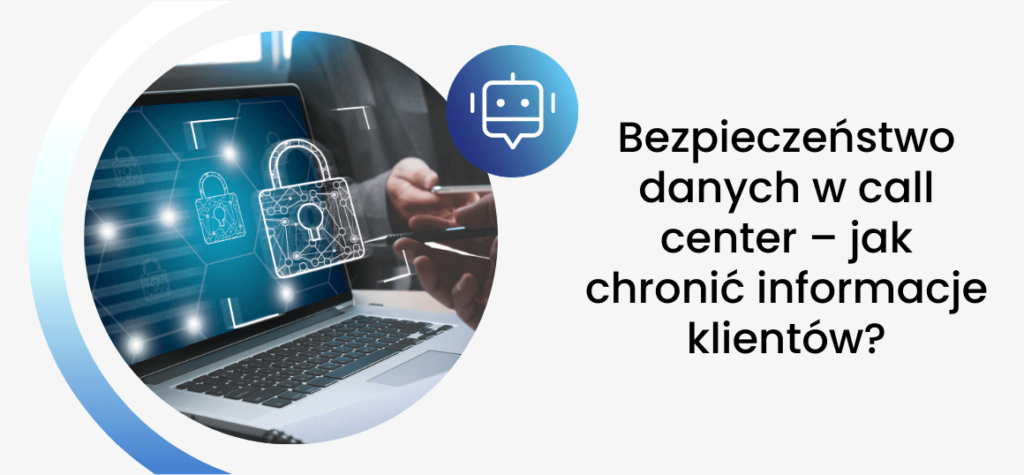Data security in call centers – how to protect customer information?

Why data security in call centers should be every company’s priority?
Today’s call center is not only a customer service hub but also a critical touchpoint for handling data—often confidential, sensitive, and sometimes strategic in nature. According to IBM Security’s Cost of a Data Breach 2023 report, the average cost of a single data breach is already $4.45 million. Each call, each record in the system, and each interaction involves information whose protection is essential for responsible business operations. In the age of digitization and growing customer expectations regarding privacy, data security can no longer be considered an optional extra—it’s the foundation of trust upon which long-term relationships are built. In this article, you’ll learn how to safeguard data security within your contact center comprehensively, what’s already working well, and what else needs your attention in this area.
Data encryption – the cornerstone of digital security in call centers
But what exactly is encryption? In simple terms, it’s a process that transforms readable information into a series of incomprehensible characters inaccessible to unauthorized individuals. Even if data were to fall into the wrong hands, without the appropriate decryption key, the information would remain useless. In every call center, this is particularly crucial—telephone conversations (including those handled by modern voicebots) may contain personal details, order information, and occasionally financial data (such as payment card numbers). Protecting these details is fundamental. End-to-end encryption (E2EE) ensures that information is secured from the moment it is transmitted by the customer through to its storage in the system.
It’s also critical to use secure data transmission protocols, such as HTTPS (SSL/TLS), to prevent data interception during transmission. Importantly, encryption does not apply only to data in transit—equally essential is securing data “at rest,” meaning data stored on servers and in databases. Such practices not only protect against cyberattacks but are also mandated by regulations.

Controlling your contact center – how to manage employee access?
Data protection in call centers starts with the basics—one of which is access control. According to the Verizon Data Breach Investigations Report 2023, as many as 74% of data breaches result from human error, including unauthorized access. In practice, this means every employee should only have access to the data and functions genuinely required to perform their job duties—and nothing more. This model, known as the principle of least privilege, significantly reduces the risk of accidental or deliberate security breaches.
Equally important is implementing robust authentication methods, such as:
- passwords meeting complexity requirements as per NIST SP 800-63B standards (minimum 12 characters with mixed character types),
- two-factor authentication (2FA)—typically via SMS, mobile apps (e.g., Google Authenticator), or tokens,
- biometric identifiers—such as facial recognition or fingerprint verification for agent login systems,
- access logging and auditing—logs should be archived for a minimum of 12 months.
It’s essential to recognize that access control isn’t a one-time setup—it’s an ongoing process requiring regular review, updates, and documentation. Changes in positions, employee departures, or the introduction of new tools should all trigger reviews of granted permissions.
Call center data protection – secure software and infrastructure
From our extensive experience, we’ve observed that call center operations depend not only on how consultants communicate with customers but also on the technological environment supporting these interactions. This also applies to advanced AI-based solutions like chatbots, which handle customer inquiries autonomously. According to Gartner, up to 60% of enterprise data leaks originate from outdated software or system misconfigurations. Therefore, every component of the technological environment—from operating systems and CRM or call center applications, to servers and endpoint devices—must be regularly updated and safeguarded against known vulnerabilities. There’s increasing emphasis on using only licensed software, ensuring vendor support and frequent security patches.
The call center’s IT infrastructure must be flexible yet resilient against unauthorized access and cyber-attacks. Thus, don’t overlook essential security solutions, such as:
Porozmawiaj z naszym specjalistą
- UTM firewalls combining network firewalls, antivirus systems, and content filtering,
- SIEM systems monitoring events and anomalies (e.g., Splunk, QRadar),
- Endpoint Detection and Response (EDR) tools, such as CrowdStrike or SentinelOne,
- VLAN network segmentation, limiting the scope of potential attacks.

Importantly, security doesn’t stop at the digital level. The hardware employees use should also be under strict control—from usage policies to physical security measures.
Many of these risks can be mitigated by implementing a virtual call center based on cloud infrastructure. This solution reduces physical server maintenance risks, simplifies the management of updates and access, and allows quicker responses to potential threats. Only a consistent approach to technology and infrastructure can create an environment in which customer data is genuinely secure.
Information security policy in companies in light of current legal regulations
A well-designed system compliant with GDPR (RODO) is based on transparent data processing purposes, data minimization principles, and clear procedures for storing, sharing, and deleting information. In addition to the General Data Protection Regulation, other legal acts also apply, including:
- The Act on the National Cybersecurity System,
- The NIS2 Directive,
- industry-specific standards—such as ISO/IEC 27001.
Equally important is enabling customers to exercise their rights, such as access to data, rectification, and the right to be forgotten. In call centers, this necessitates close cooperation among IT departments, legal teams, and consultants. Consultants, who have direct contact with customers, must understand the value of data and the responsibilities it entails. This also applies to automated interactions—for instance, those conducted via IVR systems. In a well-managed call center, legal regulations are not obstacles but rather supportive frameworks that enable secure, responsible operation with respect for every customer’s privacy.
Network segmentation and data security standards – how to separate resources to protect information
In a secure working environment, data protection goes beyond the digital layer—equally important are carefully planned network segmentation and physical safeguards. Modern call centers increasingly separate internal networks—used by employees—from those accessible by guests or external devices. Such segmentation reduces the risk of unauthorized access to critical systems and improves network traffic management. This approach not only organizes infrastructure but also increases resilience to potential incidents.
At the same time, attention should be given to physical security measures. Properly secured server rooms, access control systems, surveillance, and restrictions on equipment removal are often overlooked elements with significant implications for data protection. A coherent approach to security—both digital and physical—allows for greater control over who has access to information, when, and how. Consequently, call centers operate efficiently and smoothly, providing customers with confidence that their data is thoroughly protected.
Data security in call centers with EasyCall systems – a choice that pays off
In a world where every conversation may contain sensitive data, and each system vulnerability can lead to serious consequences, a responsible approach to information security has become the standard for modern organizations. Both appropriate technology and conscious human practices play crucial roles here.
According to Accenture, 81% of consumers now expect better data protection compared to five years ago. Therefore, it is essential to use solutions that integrate the highest security standards right from the design stage. EasyCall addresses these challenges by offering the EasyCC system, supporting businesses not only in efficient customer service but also in responsible data management. We emphasize stability, regulatory compliance, and advanced technologies that facilitate daily operations while protecting the most important asset—customer trust. By choosing EasyCall, you gain a partner who takes security just as seriously as you do. Schedule your free consultation today.
